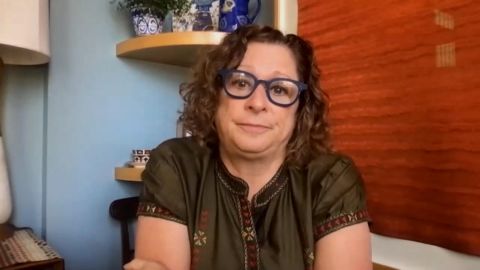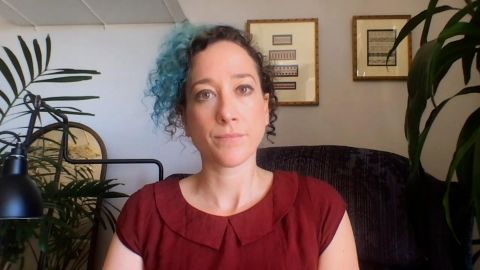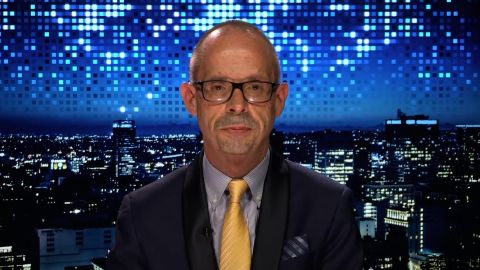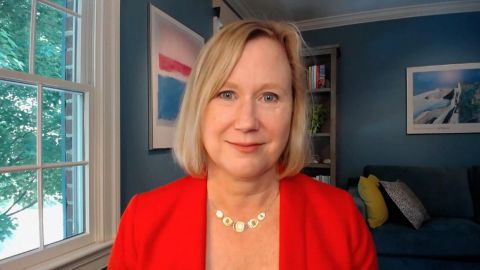Read Transcript EXPAND
BIANNA GOLODRYGA: Well, now, from the Catholic church to the magic kingdom. Philanthropist and filmmaker, Abigail Disney, heir to the Disney family fortune, was recently worth an estimated $120 million, but she’s dedicated her life to redistributing that wealth, giving away more than half of it. She explained why in an op-ed in “The Atlantic” entitled, I was taught from a young age to protect my dynastic wealth. Here she is speaking with Hari Sreenivasan about fairly taxing the rich and her famous grandfather’s lasting influence.
(BEGIN VIDEOTAPE)
HARI SREENIVASAN: Bianna, thanks. Abigail Disney, thanks for joining us. You wrote in “The Atlantic,” a passage here is, if you were to get ahold of my tax returns, you would find a record of a person who has adhered scrupulously to the law. And in doing so, has also taken advantages of the many holes our legal system has left wide open. I mean, how different are these holes? Meaning who are the holes for? Is it just for the very wealthy? I mean, can I not take advantage of any of these?
ABIGAIL DISNEY, DOCUMENTARY FILMMAKER AND CO-FOUNDER, FORK FILMS: Well, you could if you went back to school and got a degree in tax management. It’s very unlikely that you would find them. It’s very unlikely that you would set them up properly if you didn’t know your taxes inside and out. So, you know, these holes are, you know, for everybody, except that, you know, 80 percent of shares are owned by only 10 percent of the population, so anything involving equities, you know, leaves most people out. So, most of this is just so sophisticated, it’s not available to everyday people.
SREENIVASAN: When was the earliest point that you remember having conversations with accountants as normal?
DISNEY: That’s hard to say because it started so young. But certainly, once I turned 21, I have, you know, an annual and bi-annual and now, quarter annual meetings with accountants and advisers and so forth. And I can remember in my 20s when I started to do philanthropy getting into arguments about whether or not I gave away more money than I should given what was deductible. And it was interesting to get into those conversations because they were doing what they were trained and instructed to do, but I kept saying, but I’m giving it, the idea of giving is that I shouldn’t get always something in return for it. So, there was a fundamental kind of philosophical gulf there that I was always sort of fighting to preserve.
SREENIVASAN: So, let’s get into that a little bit. I mean, what is the motivation? What is the — what are the instruction sets from wealthy families to their accountants? What is the core goal?
DISNEY: The core goal is to give your children more money than you got. And if you have more than one child, that means simply preserving it won’t be good enough. If you have two, you have to double it, plus inflation. If you have four, as I do and as my parents did, that means you have to work awfully hard to get them somewhere ahead of where you started. And it is — I don’t know why, I just simply saw that hole but I was doing that for quite some time. It wasn’t, you know, until recently that I started asking myself, why would earth would that be necessary? So, that’s a deep, deep idea that gets passed too early and the other is don’t touch the principal.
SREENIVASAN: Don’t touch the principle?
DISNEY: Yes. Don’t touch the principle. If you have done that, you have violated some kind of — crossed the Rubicon and you can’t come back from that, which is nuts, very nuts, because the principle is the whole shebang.
SREENIVASAN: When I hear that goal, I say, you know what, I could see somebody, whether they’re in a developing nation or they’re middle class, they want to leave their children better off than they were, right? That sounds pretty basic and you can relate to that. But when you’re talking about these sums of money, something changes here.
DISNEY: Absolutely. And the whole point was that we had more than we needed. So, why on earth were we looking to leave our children with more than we needed? And, honestly, getting more than you need before you’ve done any work, before you’ve lifted a finger to earn it, is a very complex problem to have. And I know when I use the word problem, eyes roll all over the world as that seems like —
SREENIVASAN: Yes. I would love to have her problems, yes.
DISNEY: — an ungrateful thing. But I would tell you that things like substance abuse and divorce and people who never really find their calling in life, very unhappy people are people who inherent money. And as much as it’s wonderful, after a certain point, it absolves you of any responsibility, it buys you a life of emptiness, if that’s what you want, and it is very difficult to resist the kind of gravitational pull of what money can make you feel like you’re incapable of doing.
SREENIVASAN: So, I’ve got to ask you since you have four children, how did you sort of are you raising them? How will their life be when you’re not around if the goal of your parents were to leave you better off than they were? Well, how do you think —
DISNEY: I can tell you that they will come and expert (ph) of me if I talk about them in public. But I will say this, I have believed from the beginning that if you teach that justice and generosity are not optional, but that they’re every person’s obligation, the rest would follow from that. There is no special recipe. What you need to survive is the kind of complexities that come with inherited money are no different from what you need to survive the moral landscape anywhere. You just have to bring what you know about what’s right and wrong to everything you do.
SREENIVASAN: You began years ago campaigning for changes at the very organization that has your name on it. I remember part of it was around the compensation of the CEO at the time, Bob Iger, who was making somewhere around $60 million, $65 million. Why did you start to do that when technically it’s the success of these theme parks and this brand that is actually fueling your wealth?
DISNEY: Absolutely. And there are two reasons for that, one selfish and one not. Because the selfish one is, I care about the long-term well-being of that company. And when you pay your CEO $66 million in a year of record profitability, you make $9 billion in share buybacks, rather than to compensate your freaking employees, who are working really hard to make that park be the magic place that it is. That seems to me to be very dangerous for the brand. So, first of all, there’s a selfish reason for it. But above that, I have very personal memories of going to that park with my grandfather and I remember how he interacted with people there, and how much they cared about him. He knew everyone’s name. He asked about their families. He asked about their children. It was a family. And I use that word quite intentionally. It was a family. Now, a massive multibillion dollar global corporation can’t function like a family, I recognize that that’s not practical. But that doesn’t give you license to stop doing the very basic things we should all do for each other as a human being, which is ensure that if you work a full-time job as hard as you can, you should be paid enough to put food on your table. And that is not happening at Disney. And I’ve been at the food bank and I’ve seen what’s happening. I don’t care what they tell you about what they pay people. I’ve seen many people are struggling and I’ve heard it from their mouths directly. I can’t bear it. I was told by my grandfather to respect every last one of those people and I can’t stop doing that.
SREENIVASAN: I mean, it seems somewhere along the line that between the time when you walked around the theme park with your grandfather and today that we’ve shifted thinking about what a corporation’s responsibility is or was and to who.
DISNEY: Yes. We — and I’m working on a film about precisely this issue, because it’s important to unpack what’s happened. You know, it was around Barry Goldwater’s loss (ph) that the Republican Party, even though it was out of power, really got energized around the idea that the wealthy in this country were being victimized by social structures and government institutions, and that it needed to be — the country needed to be transformed. And there were advocates like Milton Friedman for a different way of looking at business and there were people like Lewis Powell, who wrote the Powell Memo in 1971, which is the most important document in the world that nobody knows about, which is essentially a plan to take society back over for business interests. And by the 1980s you have Gordon Gekko saying greed is good. I remember that. I was in the movie theatre when he did that, and there was cheering for him. So, there was a shift in our way of understanding individualism as opposed to collectivism, our understanding of what the new deal had gotten us and what it was for and about, that, frankly, was quite orchestrated more than we have any idea by people who had a very specific plan. In the 1980s, my very, very conservative uncle who had worked in the Reagan administration, said to me, you know, democracy is nice, but people, you know, aren’t really very smart and they’re not well-informed. I know now that this was straight from Milton Friedman, what he was saying to me, because people can’t really handle leadership. They don’t know enough. They’re not smart enough. It’s best to leave leadership to the people who already have it because they’re the ones who know how to wield it. And he was a good man. He was a decent human being. But this is an idea that runs very deep in conservative circles. They don’t say it out loud, but they really have a problem with democracy. And as you look at the political landscape now, you see that what they’ve been trying to do is beginning to really happen. This is the result of decades of very heavily resourced people investing a lot of money in making that happen. That’s why we need money out of politics. That’s why we need wealthy people to get their (INAUDIBLE) out of the way of how things work.
SREENIVASAN: Well, what is your prescription for how families should deal with this almost dynastic wealth that keeps getting handed down?
DISNEY: First of all, we as a public should deal with it by structuring our taxes so that we prevent dynasties from forming. Dynasties are very bad for democracy, very bad. And the further out you get from the person who generated the wealth, the less understanding there is of what it took to generate that wealth and less empathy there is for people unlike them. And so, it becomes harder work to construct a democracy when even the most powerful people in it don’t have a clue what it’s like to live a real life. So, first of all, that’s something that we as a public should do. In the families, I would warn the parents that I struggled. I took a good 20 years of my life struggling with finding my way morally and imaginatively because of the weight and the enormity of what I was handed, for which I am very grateful. But which, nevertheless, was asking things of me, was closing doors to me, was changing the way the world interacted with me and vice-versa in ways that I wasn’t necessarily proud of. And I had to fight and struggle hard. So, parents need to understand, this is not some nice happy little gift tied up with a bow. It has an ugly dark side. And they need to be transparent with their children about that. They need to talk about it from the beginning. And they need to work hard to instill the kind of values, deeper, more humane values that will stand them in good stead when they do struggle, because they will.
SREENIVASAN: You know, a lot of family wealth has been transferred through foundations. The Carnegies, the Fords, the Gates’. Why not a Disney foundation?
DISNEY: No. I spent a lot of years in philanthropy working very hard on trying to be smart about where the money went and who it was for. And as time went on, I thought, oh, my gosh, this is structural. Let me see if I can fund philanthropy around structural change. But the reality is that philanthropy is not accountable, it is run by people with egos and agendas who aren’t necessarily interested in what society wants and society needs. And even with the best of intentions at all, I don’t want to live in a country where our decisions about who gets vaccinated, our decisions about what newspapers survive, our decisions about whether and when food gets distributed to poor people are up to a handful of people who have a set of traits, some of which are wonderful, many of which are awful, that enables them to accumulate that kind of money. That’s not the country I want to live in. So, the bottom line about philanthropy is accountability. We can’t rely on people who are not accountable to us for how they make their decisions.
SREENIVASAN: You talk about changing the tax structure, and I know you are part of Patriotic Millionaires movement. Tell me a little bit about that.
DISNEY: Well, we are a group of people who have obviously done really well in the great lottery of the American economy, and we see how much of that happens because of tax structures. Hedge fund managers, as an example, have been, you know, wildly well rewarded for their work, not because they’re brilliant, although many of them are, but also because their income isn’t taxed as income. It’s taxed as capital gains. So, most of what they get rewarded in isn’t taxed and that is subject to compounding and all the other things. You know, a difference of 20 percent in how you’re taxed is the difference between being a millionaire and a billionaire over a lifetime of work. So, the tax structure has been cutting slack to the financial industry, the people who run the financial industry and to people who are already resourced to the point where you would be a fool if you couldn’t grow your money into billions.
SREENIVASAN: Do these patriotic millionaires withdraw their financial support for these politicians when it comes to these issues?
DISNEY: Yes, we do that. We absolutely do that. And I just wrote a letter to Kyrsten Sinema yesterday, which when I put up on Twitter, because I felt it was really important to say that democracy is not just an exercise in the majority getting its way all the time. I appreciate her bipartisanship there. But it’s also a question of, will anybody advocate for interests that are not their own? Because up to this point, that’s all we have, is a bunch of interests competing with each other. I am the person with money in politics and I am going to use that to get people with money out of politics once and for all. Because this is the only way we’re going to have a system less warped and paralyzed than the one we have. So, the Patriotic Millionaires are sort of a ceremonial suicide entity that we are just looking to undermine our own power because that’s what’s for the good of the whole.
SREENIVASAN: You know, how do we redistribute the power that accumulates with your wealth, right? I mean, you have access to other powerful people that the rest of us fight to gain access to, whether it’s calling a senator on the phone, whether it’s — people will respond because they see sort of on their speed dial or on their caller I.D., oh, it’s Abigail Disney, I’m going to take this call.
DISNEY: A certain amount of power comes with money just as a necessary evil. And I try to use that power and access to undermine power and access for people like me. So, I would hope more people come forward and try their best to do the right thing by the larger society, which is to pull out of politics the power of money.
SREENIVASAN: Abigail Disney, thanks so much for joining us.
DISNEY: What a pleasure.
About This Episode EXPAND
Susan Lund; Samantha Stark; John Allen; Abigail Disney
LEARN MORE



